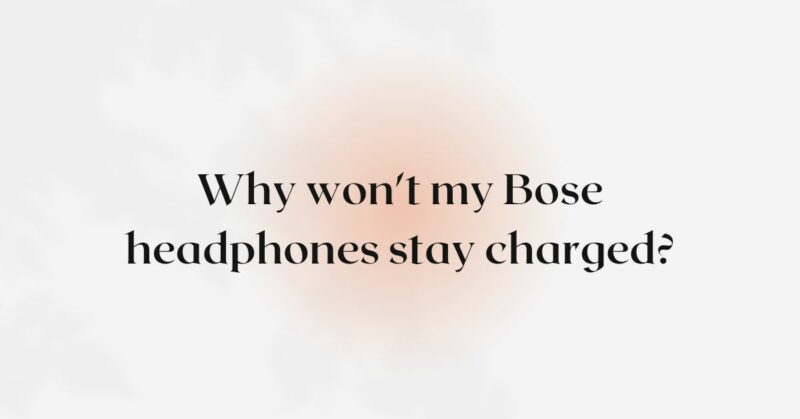Bose headphones are known for their exceptional audio quality, innovative features, and sleek design. However, if you find that your Bose headphones won’t stay charged, it can be frustrating and inconvenient, hampering your listening experience. In this article, we will explore the potential reasons behind this issue and provide insights into how to address it. By understanding the factors that contribute to your headphones not staying charged, you can troubleshoot the problem effectively and optimize their battery performance.
- Battery Health and Age: One of the primary reasons your Bose headphones may not stay charged is related to the battery health and age. Lithium-ion batteries, commonly used in headphones, have a limited lifespan and gradually lose their capacity to hold a charge over time. If you have been using your headphones for an extended period, it is possible that the battery has degraded, resulting in reduced charge retention. In such cases, contacting Bose customer support for battery replacement options is recommended.
- Charging Cable and Connection Issues: Sometimes, charging cable or connection issues can prevent your Bose headphones from staying charged. Ensure that you are using the original charging cable provided by Bose or a certified third-party cable that meets the necessary specifications. Check the charging port on your headphones for any debris or damage that could affect the connection. Also, ensure that the cable is securely plugged into both the headphones and the power source. If you suspect a faulty cable or connection, try using a different cable or charging adapter to determine if the issue persists.
- Power Source and Charging Method: The power source and charging method can also impact the ability of your Bose headphones to stay charged. Ensure that you are using a reliable power source, such as a wall outlet or a USB port on a computer or charging adapter. Avoid using low-power USB ports, as they may not provide sufficient power to charge the headphones effectively. Additionally, avoid charging your headphones through a USB hub or extension cable, as these may introduce power fluctuations that can disrupt the charging process. Directly connecting the headphones to a power source using the provided cable is typically the most reliable charging method.
- Charging Time and Overcharging: Proper charging time is crucial to ensure that your Bose headphones stay charged. Overcharging or undercharging the battery can affect its overall performance. Follow the manufacturer’s guidelines regarding the recommended charging time for your specific headphone model. Avoid leaving the headphones connected to the charger for extended periods once they have reached full charge, as this can contribute to battery degradation. Disconnect the headphones from the charger once they are fully charged to maintain optimal battery health.
- Firmware Updates: Occasionally, firmware updates released by Bose can address battery-related issues and optimize power management. Ensure that your headphones are running the latest firmware version by checking for updates on the Bose official website or through the Bose Connect app. Updating the firmware can potentially resolve any software-related issues that may be preventing your headphones from staying charged.
- Environmental Factors: Environmental conditions can affect the charging performance of your Bose headphones. Extreme temperatures, whether hot or cold, can impact the battery’s ability to charge effectively. Avoid exposing your headphones to excessive heat or cold during the charging process. Charging your headphones in a moderate temperature environment can help optimize the charging performance and ensure that the battery stays charged.
- Usage Patterns and Battery Consumption: Your usage patterns and the features you use on your Bose headphones can influence their battery consumption and the ability to stay charged. Active features such as active noise cancellation (ANC), Bluetooth connectivity, and voice assistants consume more power, leading to faster battery drain. If you frequently use these features at high levels or for extended periods, it can affect the charging performance. Consider adjusting the usage of active features or disabling them when not required to conserve battery power and improve charging efficiency.
- Troubleshooting and Battery Calibration: If your Bose headphones still won’t stay charged despite taking the aforementioned steps, troubleshooting and battery calibration may be necessary. Bose provides troubleshooting guides for various headphone models on their official website. These guides offer step-by-step instructions to address common issues related to charging. Additionally, some headphone models may benefit from battery calibration, which involves fully discharging and then fully charging the battery. Consult the user manual or contact Bose customer support for model-specific instructions on troubleshooting or battery calibration.
Conclusion: Experiencing issues with your Bose headphones not staying charged can be attributed to factors such as battery health and age, charging cable and connection issues, power source and charging method, charging time and overcharging, firmware updates, environmental factors, usage patterns, and battery consumption. By understanding these factors and taking appropriate actions, you can address the issue effectively. Contact Bose customer support for battery replacement options if necessary, ensure a secure and proper charging connection, use a reliable power source, follow recommended charging times, update firmware, consider environmental conditions, adjust usage patterns, and follow troubleshooting or battery calibration steps if needed. By addressing the underlying causes, you can optimize the charging performance and battery life of your Bose headphones, ensuring they stay charged and ready for your listening pleasure.


